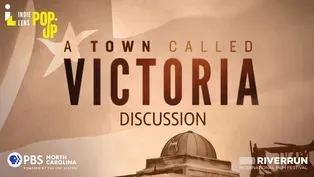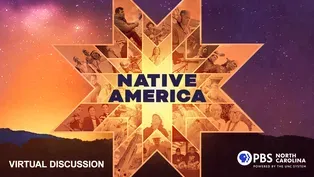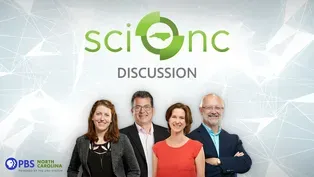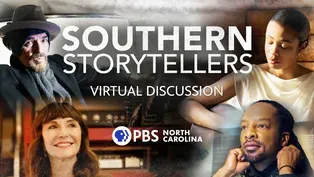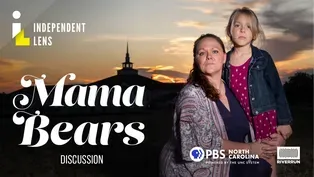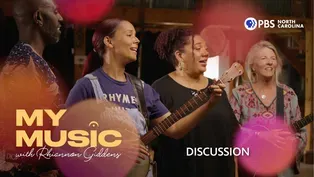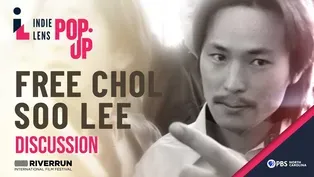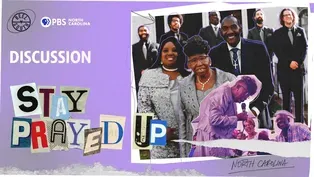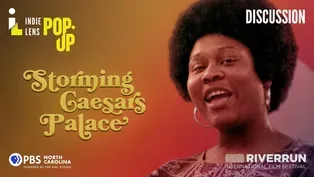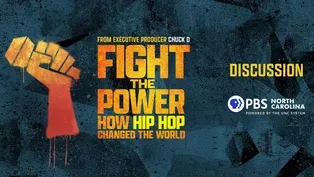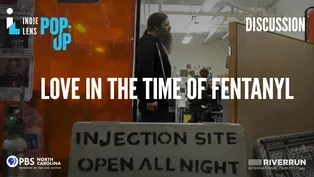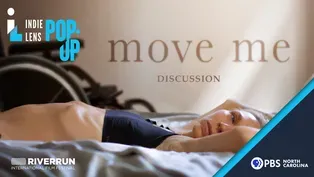PBS North Carolina Specials
Discussion | Ken Burns Presents The Gene
4/8/2021 | 1h 9m 58sVideo has Closed Captions
Lively and informative discussion with local experts.
Following the screening of The Gene: An Intimate History, PBS North Carolina's Frank Graff moderated a lively and informative discussion with local experts.
PBS North Carolina Specials
Discussion | Ken Burns Presents The Gene
4/8/2021 | 1h 9m 58sVideo has Closed Captions
Following the screening of The Gene: An Intimate History, PBS North Carolina's Frank Graff moderated a lively and informative discussion with local experts.
How to Watch PBS North Carolina Specials
PBS North Carolina Specials is available to stream on pbs.org and the free PBS App, available on iPhone, Apple TV, Android TV, Android smartphones, Amazon Fire TV, Amazon Fire Tablet, Roku, Samsung Smart TV, and Vizio.
Providing Support for PBS.org
Learn Moreabout PBS online sponsorshipMore from This Collection
Discussion - A Town Called Victoria - Independent Lens
Video has Closed Captions
The filmmaker and former Victoria residents share their story. (46m 51s)
Discussion - Native America Season 2
Video has Closed Captions
Panelists discuss preserving the languages of Native American tribes. (39m 1s)
Video has Closed Captions
Sci NC executive producer and host, Frank Graff, chats about upcoming Season 6 of Sci NC. (26m 6s)
Discussion - Southern Storytellers
Video has Closed Captions
Author David Joy and others discuss storytelling and their new PBS series. (42m 13s)
Discussion - Mama Bears | Independent Lens
Video has Closed Captions
Producer and director Daresha Kyi discusses the film and LGBTQIA+ advocacy. (34m 41s)
Discussion - My Music with Rhiannon Giddens
Video has Closed Captions
Discussing the series with producers Will & Deni McIntyre and country artist Rissi Palmer. (39m 56s)
Discussion - Free Chol Soo Lee | Independent Lens
Video has Closed Captions
Local lawyers, professors and nonprofit leaders discuss wrongful convictions and reentry. (40m 44s)
Discussion - Stay Prayed Up, Reel South
Video has Closed Captions
The filmmakers discuss their journey with Mother Perry and The Branchettes. (45m 4s)
Discussion - Storming Caesars Palace | Independent Lens
Video has Closed Captions
Local professors and nonprofit leaders discuss welfare and the social safety net. (33m 2s)
Discussion - Fight the Power: How Hip Hop Changed the World
Video has Closed Captions
Local experts discuss the history of hip hop with PBS North Carolina. (59m 43s)
Discussion - Love in the Time of Fentanyl | Independent Lens
Video has Closed Captions
Local harm reductionists, therapists and others discuss the opioid crisis and more. (55m 44s)
Discussion | Independent Lens: Move Me
Video has Closed Captions
A dancer with blindness and disability advocates discuss adaptable arts programs. (38m 46s)
Providing Support for PBS.org
Learn Moreabout PBS online sponsorship- Fascinating clips from "The Gene: An Intimate History".
We hope you enjoyed all of them.
We are live now for the discussion part of the evening.
I'm Frank Graff, Producer of Sci NC on PBS North Carolina.
Thank you all for watching, for joining us, and thank you to this awesome panel we have assembled to talk about what we've seen, and to answer your questions as well.
They've been a lot of fun to work with on this project.
So I wanna say first off thank you to all of them for joining us.
What I'd like to do to get us started is introduce each of the panelists, and then have them give you a brief talk of where they work and what they are doing.
And then we'll get started.
So Julie Horvath, why don't you start us out?
- Great, thanks Frank.
I'm really happy to be here.
So I am jointly appointed between North Carolina Central University and the North Carolina Museum of Natural Sciences where I'm the head of the Genomics and Microbiology Research Lab.
I am also adjunct at Duke University and NC State University.
And my research really focuses on comparative genetics.
So I compare the genomes of humans to other primates to try and understand how we have different characteristics and how those DNA sequence differences might relate to why we are more or less susceptible to certain diseases.
I'm also really fascinated by the microbiome.
So anybody who's come to my lab can see that we study the microbes that live on people's skin.
So those are the bacteria and the fungi that live on your skin.
And I use an evolutionary approach there.
So we compare the microbes on humans to other primates and we try to find out why our own genes and our daily habits actually impact the microbes that live on us, and then how those microbes in turn connect us to health and disease as well as our behavior.
- Julie, thank you.
Fred Gould, why don't you go next?
- Yes.
Fred Gould, I'm at North Carolina State University.
I was trained as an evolutionary biologist and geneticist and I work at North Carolina State University on Applied Evolutionary Biology, especially in agriculture and health.
I'm the co-director of our Genetic Engineering and Society Center.
So very much involved in bringing the social sciences and ethics into what's going on in genomics.
And I personally work on genetically engineered crops, but recently I've gotten involved in working with genetically engineered mosquitoes that transmit dengue and malaria.
And I'm actually on the ethics committee of the Gates Foundation Group that's working to try to use genetic engineering to get rid of the mosquito that transmits malaria.
- Be nice just to get rid of mosquitoes in general, but I don't wait to go that far.
[Frank laughs] Thank you, Greg Matera, go ahead.
- Hi, Frank.
It's a pleasure to join you tonight, thanks.
I'm a professor in the integrative program for biological and genome sciences at UNC Chapel Hill.
And I have a split appointment, both in the College of Arts and Sciences and the School of Medicine.
I run a research lab here on campus, and I teach a course on Advanced Topics in Molecular Biology.
And in the lab, we have two main major areas of interest, both of which we've all around the study of RNA.
The first area is focused on trying to understand the effects that chromosome packaging has on the expression of say a given messenger RNA, and the second research area centers around the gene function of the gene that causes spinal muscular atrophy.
The one that we just saw in the clip about Audrey Winkelsas.
And despite the fact that there are now effective treatments for this disease, we really don't understand what causes it.
And so that's the area of research that my lab focuses on.
And you might be surprised to know that we actually use a fruit flies in the lab to study both of these topics, and that I'm also an amateur genealogist.
- Very good, fruit flies, love that.
Love that, all right.
And Matthew Schu, go ahead.
- Thanks, Frank.
It's a pleasure and honor to be here today.
My name is Matt Schu.
I'm a bioinformatician at RTI International.
I also had a group there called the Omix Epidemiology Analytics Program.
As a bioinformatician, my job is really data wrangling.
And by that, I mean, my job is writing code to get large datasets kind of the data that's coming off of gene sequencers and other kinds of machinery to talk to other large data sets.
Sometimes it's HR records, sometimes other public health data sets.
And the goal there is to bring this data together in such a way that we can try to tease out how patterns and the genome are gonna relate to patterns in public health.
Originally, I started off my career in math and physics, but I got pulled into bioinformatics just by seeing the wealth of data that's out there, and the potential for that data to really help us understand human biology and human health.
And so when I got my degree in bioinformatics, I got a chance to bounce around and work in a lot of different diseases.
Started off in diseases of aging like Alzheimer's, understanding how risk variants in the genome kind of predispose folks to Alzheimer's disease.
Spent some time working in the cancer space, understanding that genetic disease.
And then since I came to RTI, I've had the opportunity to work on single gene disorders like sickle cell disease or SMA like we're mentioned in the video.
Understanding how we can classify variants that was observed in the population, but don't really yet know if they're causal to the disease and try and basically use what we do know to inform the models that are gonna predict the significance of yet to be classified mutations.
- All right, Matt.
Thank you and thanks to all of you.
Reminder everyone, please type your questions in the chat and we'll try to get to as many of them as we can.
But let me start off just a couple of general questions.
COVID-19 obviously is on everyone's mind.
It is ruled our lives basically for the past year.
China released the genetic code for the coronavirus that causes it in January.
Vaccines obviously soon followed in the summer.
And then they are continuing to be injected into people's arms once they were approved.
Can you explain how one led to the other?
They kinda hinted at it in the show a little bit, but go ahead.
Can somebody explain how one led to the other?
- Well, I'll-- - Go ahead!
- I'll shoot a little bit being an RNA biologist.
So RNA recently become used as medicines and they were not really accessible as medical tools so much beforehand.
Just because it's really hard to get a long biomolecule that's highly charged like RNA into the cell.
And so the technology to really develop that has only come very recently with nanoparticles, the BioNTech people, and Moderna.
People have developed two independent ways of packaging up RNA to sort of make it look like a virus on its own.
And that's how they get it to work as a vaccine.
But there are other RNA drugs, based drugs, that are just now really hitting the market.
And one of them is the drug that has been used first to treat spinal muscular atrophy.
There are a couple of other small molecule drugs that have been developed as well.
But I think that's really the development, is that they released the sequence and because the platforms had just really gotten built to that time where they could be used to make vaccines, these companies pivoted immediately and it was astounding how fast they were able to change and make these drugs.
- And just to be safe for those who might be wondering.
DNA, obviously, and then there's RNA, what is the difference?
I know MRNA, I think is messenger RNA.
Just in case people are a little lost on that, why don't we go back a little bit farther with it.
Anybody.
Greg, go ahead.
- Sure, so DNA, I don't know if anybody watched the full movie about Eric Lander gets on there and he talks about how DNA is kind of a dumb molecule, right?
And DNA's a dumb molecule because it doesn't actually do much.
And it works really well as a storehouse for genetic information.
RNA is the central molecule.
Just like chemistry is the central science.
RNA is the central molecule in that pathway of information from DNA to RNA to protein.
And so RNA can speak sort of both languages.
It can speak the language of DNA and base pair with it and talk to it.
It can also speak with proteins and it can even carry out enzymatic activities.
And so I think the development of these RNA drugs has taken a long time because simply, it's also kind of labile, but RNA is a little more clever than DNA and it has that OH group on it.
Deoxyribonucleic acid versus ribonucleic acid.
So it has an extra chemical group.
And that OH group, that oxygen makes all the difference in the world when it comes to doing the chemistry.
- Do you think that, Greg or to anyone, do you think because we here, you're right you hinted at it, but we have seen this development of these vaccines so incredibly quickly, and the year before, five to 10 years to develop.
Do you think because this new development in vaccine is what is, it's quick and is working that could speed the development of vaccines or medicines for other diseases, for other treatments, because, surely we're gonna have more pandemics, and a lot of other things.
We want a cure out there.
- Yeah.
- Yeahs so actually a point I was gonna raise in the last questionnaire.
And so one thing to remember is that we didn't start from ground zero.
We got to leverage all of the work and experience that we've had in building vaccines when we got to start the COVID vaccine.
And then the other thing I was gonna mention is the importance of knowing the sequence is knowing specifically where we need to target a vaccine for.
So we pick areas that are, for example less likely to mutate, that are gonna be robust to mutations that are gonna develop just naturally, because that's what viruses do, they mutate over time.
And it's interesting prior to COVID, if you can remember a time before that, I actually had friends of mine at RTI who we're talking about developing a unit, what was called the Universal Flu Vaccine.
Every year we have a new vaccine we have to get over and over again.
And prior to COVID-19, one of the goals in science was trying to figure out, well, can we just figure out one shot to get it all done and cover them all?
And there was real hope for that.
There was real hope that might happen.
And it was founded on understanding the flu genome and what was gonna be the most stable part of that genome, and then targeting vaccines that are gonna mimic that area.
- So from that, you could, we kinda target the flu vaccine looking at viruses that are happening over in Asia and other parts of the world and kinda predicting how they get to here.
Do you think it may speed up the development of a flu vaccine and maybe a more effective flu vaccine, 'cause you wouldn't have to wait for months and months and months you could say, "Okay, well this is what's here.
We can do this."
Any sense?
I'm thinking that when I get my flu shot, I'm gonna remember this conversation.
[Frank laughs] Do you think it could speed up the development?
Anybody?
- I think we've learned quite a lot.
And not being my particular area of expertise, I don't wanna over commit, but we've learned a lot.
- All right, very good.
- There are definitely gonna be RNA medicines coming down the pipeline for anti-cancer drugs, because basically what you can do now is now that you can get an RNA inside of a cell, you can have it make whatever antigen you want rather than trying to just create that antigen and then put it in somebody's bloodstream.
And so the antigen is the thing that your immune system identifies as not being you and then attacks.
And so now, like getting back to your very first question, and once you have that sequence information, right?
Now you can, and because the weird thing is the the genetic code is universal.
All organisms use the same code.
Once you know that sequence, you can get it expressed in humans by delivering a messenger RNA.
- We're hearing a lot about, and you hinted at it, about variance and someone described to me once, variants are that, Frank, did you ever copy notes from people?
Yes, I have.
And invariably, in copying the notes you make a mistake somewhere, and that's basically what a variant is.
It's the cells making an oops.
Maybe not a good explanation, but how does it variant happen?
And what does that mean for a vaccine?
What does that mean for a lot of things?
What's a variant?
- Frank, I can take that one.
- Go ahead.
Okay go ahead.
- So yeah, just a variant is just a mutation or a different DNA sequence.
And sometimes they just happen because they are an oops and they are a mistake.
Anytime you're trying to copy a genome you can make mistakes.
There are certainly chemicals that can also cause some of these mistakes more often.
So there are a lot of reasons that you can have a variant, but sometimes these variants just happen.
And with the virus infecting so many people, you have a lot of opportunities for it to replicate and make mistakes.
And so you're gonna have mistakes the more times that it copies itself in different people.
And so that's one of the challenges with this vaccine depending on where that variant is, what region it's in.
Is that variant in the protein that we use to make that MRNA vaccine, or is it in a different region of the genome of SARS-CoV-2?
So if it's in that messenger RNA that we used to make them the virus, the vaccine to it, then we might have a problem 'cause maybe that variant now is gonna make that virus look different than what our body is gonna recognize as a foreign invader.
And so maybe our body won't recognize it as well.
It sounds like so far, the vaccines still are pretty good.
They are very efficacious at recognizing.
So even if there are variants, they still work pretty well.
And so that's our hope, is that we're gonna reduce down the number of variations out there, and get enough people vaccinated so that we don't have as much virus floating around and making more mutations.
- One of the things you keep hearing is it's almost a race against the virus and vaccines to reach herd immunity.
What is herd immunity?
Is that where there are enough people vaccinated and enough people have gotten and survived the disease that the virus just can't spread?
What is herd immunity?
- Maybe I'd step in here and talk-- - Fred, go ahead.
- Right, I mean, so you could just imagine basically there are a lot of people who've been vaccinated or who have already had been infected by the virus and become immune.
Well, if you bump into them in the grocery store and you haven't had the virus, that virus isn't going anywhere, it's a dead end for it.
So if you have a certain percentage of dead ends, the virus basically is being transmitted and doesn't go anywhere, it falls off the face of the earth.
After a while if the virus is replicating from one person to the other about four fold each time, a cycle goes through, and then three out of four people are immune because they've either been vaccinated, or have had the virus, then it doesn't increase in numbers and then it can go down over time.
But I just wanted to mention that when you mentioned this race between the vaccination and the variants coming up, right now it seems like the variants are coming and then we're dealing with them.
And in the future, is there a possibility that we will be able to predict what those variants would be that would really change the capacity of the virus and get out ahead of them?
And that's not now that I know of, but I think it could be down to bike.
- I would imagine we're gonna be needing it at some point, some kind of a booster shot.
I would think to what you said, there's enough variance out there, or the effectiveness of the vaccine [indistinct].
- Right, but right now we're creating the booster shot once we have variant.
And then the question is could we be already creating the booster shots anticipating specific variants that would be problematic.
- And of course it depends on the rate of viral mutation.
Not every virus has the same mutation rate because by the way, these viruses, as Julie mentioned, have RNA genomes and not DNA.
And so they come into our cells they have to copy their genomes into DNA to replicate for a little while.
And the process that that occurs by is actually naturally a little more prone to mutation than for example, the replication machinery that replicates our genomes.
And so viruses mutate more rapidly, and influenza virus mutates even more rapidly than SARS-CoV-2.
So we kinda caught a break there, if you wanna say something a little bit there and then as Matt was talking about, we also wanted to look at a part of the virus that doesn't change so much in addition to whether or not the overall virus is not very mutagenic or not.
- A reminder to-- - Just to mention one thing, Frank.
- All right, go ahead, Fred.
- You brought up herd immunity.
And the question is, why do we call it herd immunity?
Were not a bunch of cows, right?
- Moo!
[Frank laughs] - I mean, you could call it community immunity if you wanted to, but I think we inherited that name and we've stuck with it.
- Community immunity does have a good ring to it.
I gotta admit I like that.
A reminder to those watching, please type your questions in the chat.
And we are getting some questions.
Let me start to go into for some of these.
And again to anyone on the panel.
Questions, "Why can't we alter genes for good?
Eliminate the gene for a particular disease such as Alzheimer's or eliminate the genes for various addictions."
Any thoughts, just ethics or technically impossible, or maybe all of the above, anybody's thoughts.
- I guess I'll jump in quickly.
- Go ahead!
- And I think others might piggyback on it.
But a lot of the genes that cause disease are actually necessary for us to survive.
So they do things that we need to live.
And so we can't eliminate them, because we need them to do things.
It's just when they mutate, sometimes then they can cause problems and cause disease.
And so I think that's a very important point to notice that it's kind of a double-edged sword, that we need a lot of these genes around.
- So for sickle cell, some of those genes that they were talking about, you can't really get rid of those, because again they help you live.
- Well, again, they weren't really, I don't think planning on getting rid of the genes.
They're thinking about getting rid of the variant if you will, of the mutant copy, and only replacing it with the good copy.
Now that just gets into the whole eugenics thing, and so what people have resisted tremendously is trying to mutate the germline.
Mutating something in the bloodstream, in your blood cells, STEM cells that make blood to to fix sickle cell disease or leukemia, or some of these other diseases, you could fix those with gene therapy, but that won't be passed on forever.
When you change the germline, you're changing the human genome forever.
And that's a big thing to think about 'cause we actually don't know all the variables, and time and time again it's been shown that the hubris of man when you think, you know everything, it's just a bad idea.
- I'll add to that.
That there have been a lot of these high level panels discussing the ethics of these issues.
The National Academy of Sciences of the United States has done that.
But they've brought in people who were suffering from these diseases or our idea of suffering, but some of them don't see themselves as suffering from that disease.
They see themselves as different.
And so you could have something where you think everybody needs to be cured of something, but those people themselves don't really want it.
So it is a very important cultural issue in terms.
And you saw in the film about what happened with the Eugenics Movement.
But another point I just wanna bring out is that we talk about diseases as if you could fix them by changing one variant.
And we're going after those, there's a movement.
But many diseases are caused by tens to hundreds of different genes interacting with each other.
And those are a whole different situation.
And they also depend on the environment you're in.
So we're babes in the woods in some ways.
Even though we've made huge progress, we're just starting out in this venture and we don't wanna do harm.
So we wanna make sure that when we make changes, we don't do anything bad.
- I think you also wanna worry about the butterfly effect.
If you remember that famous science fiction novella.
What happens if Stephen Hawking's mother cured ALS in him before.
Would we have Stephen Hawking?
Would he have become a physicist?
Would he have done any of those things?
You're changing the future forever.
So I it's just, hmm.
- Well, and you've all hinted it.
So let me go ahead and ask the big 5,000 foot question.
Is there a danger, and maybe it's already happening, but is there a danger that technology outpaces the ethics?
They hint at a hinted edit in the film a little bit.
What are your thoughts?
That as a concern 'cause this Fred said we've made huge leaps and bounds in our knowledge of this.
What are your thoughts?
- All right, I'll jump in here.
- Go ahead!
- I've been wrestling with some of these things with our Genetic Engineering Society Center.
And it comes up to some very difficult things.
One piece, I said that we're babes in the woods here getting started, but we also have to think that 20 years ago, where were we with computers and where are we today?
Where are we gonna be 20 years from now?
And would it be a public kind of issue about genetically engineering germline or would it something that parents choose and pay for?
What happens with equity issues?
There are plenty of science fiction books about how you wind up with these two different classes of improved and not improved human beings.
I think everybody should watch the movie, "Gattaca" which discusses this issue in a beautiful way.
How are we gonna use this tool?
So are we gonna use it in an equitable society, or are we gonna use it to cause differences in society?
- Is there, someone else is asking, is there any kind of... You've seen it in the movie that some kind of the research like the scientists over in, I believe it was China, was doing, would have been illegal in the US.
Are there any legalities to doing various genetic testing, genetic experiments?
I know you have panels at your universities or wherever to present to, but what are the controls for something like this?
Go ahead, Fred.
[Frank laughs] You grabbed it!
- Well, I don't completely have it, but we do definitely have controls at the university.
Of course there is a specific board that you have to go through for any experiments with anything that would be genetic engineering.
That's for sure.
But anybody funded by the NIH, the National Institute of Health, has to go through those kinds of things.
It's a little bit different for a company, but FDA, there's all sorts of regulations on this ever since the 1970s when we first started doing genetic engineering.
At that point it was the scientists themselves who thought, "Wow, we better self-police because we don't have the regulations yet."
And now we have, really with genetic engineering, we have the FDA, but we also have EPA on certain things that could affect the environment and so on.
So we do have a lot of regulation.
But it's being discussed a lot right now, in terms of where are we gonna go from here?
But others may have more insight into these things.
- I mean, there are institutional review boards in every hospital in the country.
And it's just, if you're going to do an experiment on a human that's not allowed.
And so only experimental medicines that have been ethically approved and approved in terms of safety.
I don't know if Matt has any insight in that or Julie.
- Yeah, no, just to say that the same clinical trial process, we have like phase one, phase two, phase three, still applies for gene therapies as well to the best of our ability.
And working in, sometimes it involves model organisms or cells there, maybe it's a petri dish of skin cells before we actually put that in a human, but we do you do the appropriate testing ahead of putting that into a human being.
- I would imagine that someone else in the chat here asking you a question.
Besides just the ethics of experimenting, if you will, on humans, there's also a concern with just the environment in general and you don't wanna change things too much, because you don't know what the effect would be on the environment if you're manipulating things as well.
Is that a concern, or is the environment just so broad that now that really gonna change anything?
Any thoughts, anybody?
- I don't think we wanna get into global warming on this particular panel, but we've definitely already done it.
- Greg, good point.
[Frank and Greg laughing] - There are some projects aimed at using genetic engineering, I just said to get rid of mosquitoes, but there are also projects aimed at getting rid of rodents on islands.
Where they're decreasing biodiversity on islands.
So there's this kind of move to see if we can write things that we've messed up.
All right.
And there's a lot of discussion in the environmental community, and the conservation community in terms of whether we should use these tools.
And a little bit to get back to Greg's saying, is we've messed things up and now we're gonna come back and use technology to fix that.
What else are we gonna do?
So I think that there's been a lot of soul searching here in terms of not wanting to repeat things we've done before in a quick way.
And so, but I would say that those technologies are moving ahead and some of them could actually result in saving species.
- I don't wanna mention "Jurassic Park", but go ahead.
I'll mention "Jurassic Park".
- Yeah, that is fascinating.
I mean, think about when that movie came out, everybody was, "Wow, okay."
But not that we're there yet, but technology is moving along.
It's a-- - That's definite.
- A very famous geneticists George Church at Harvard, who is interested in bringing back the wooly mammoth.
And there are other people who wanna bring back other species.
And George Church thinks this will help the environment, to bring back the mammoth.
So, I mean, there are a lot of these kinds of ideas floating around, but it's not gotten out of the box.
That's for sure.
- Interesting, all right.
Someone in the chat is asking, and this is something that boggles my mind all the time.
How can a single letter in a strand of DNA cause a person develop a severe disease?
It is one of those wild questions, but yeah, that's the basis of all kinds of things.
Who wants to take that?
- I can take a stab, but there's lots of different ways for that to happen.
So I think one thing that's really important to understand is that a gene is this effect as a segment of DNA that's a set of instructions.
And like all instructions there's some important, really, really important parts.
In particular start and stop.
And their code ons, there's a sequence of letters in the DNA that encode for those really, really, really important instructions.
Start building protein here, stop here.
And so one particular type of single-base pair mutation that can cause this massive catastrophic event is if you have an air and that start part, or if you something in the middle gets changed in, from keep building into stop, and then the protein is truncated and you don't produce the protein ultimately.
So it's just a really, really, really bad typo.
And that's one of the reasons why you get two copies of DNA typically from your parents for most of your chromosomes.
And you can tolerate one bad set of instructions, but there's a lot of recessive disorders that occur when you get two sets of faulty copies.
And then your cells just don't know how to make that protein that were in that instruction.
So that's one way, although there's a myriad other ways that things can go wrong.
- If I can pop in, I wanna kind of touch on what Matt's saying, but also kind of remind people that some of the reasons we get some of these variants or some of these mutations, is because there's some selective pressure acting on that gene or that variant.
And so that was, I kinda wanted to get back to that point, because for example sickle cell anemia is a trait that arose because it is protective against malaria which is a very detrimental disease.
So if you live in a place where malaria is endemic and very common, then if you actually have the sickle cell trait then it's protective against getting malaria.
And so some of the diseases we talk about are actually because our environment is selecting for these changes or people who have these changes are gonna be better able to survive in a certain environment or another.
So I think that's one thing to keep in mind is that depending on your environment and some of the other characteristics, maybe you actually need this variant.
And so it might not be beneficial in North Carolina, but if you live in a place with malaria, then it's very important.
- Yeah, that's a really important point, I agree.
Like variant doesn't always mean bad, and that's really important.
It's critical to like life evolution that variants occur so that things can evolve and we have adaptability as a species.
So it's really important to note that variant isn't always a negative thing.
- Interesting, okay.
Someone else in the chat saying, and this kinda hints at one of the most popular shows on PBS, finding your roots with Henry Louis Gates.
Part of the show uses genetic testing to trace ancestry.
The question this person is asking is, "Genetic testing companies sometimes tell people they have an increased or decreased risk for a given disease.
How do scientists determine that?"
Go ahead, Julie, you hinted a little bit at it, and Matt, you did too with variants, any, go ahead anybody.
- Certainly, so your DNA, you can have mutations that give you a variant that makes you more likely to have a certain disease, but the environment also plays a big role.
And so we can't always ultimately say, "Oh, you have this single base pair change or this variant, and so 100% chance you're gonna have this disease.
And we can't say that often.
There are certain diseases where that is pretty clear, but there are many diseases.
And I think Fred alluded to this before that there are a lot of diseases or disorders where there are so many variants that play a role in this.
We don't know exactly all of the ones that play a role.
So I think that's where we get into this risk of, "Okay, you have this variant, a lot of people with this variant they end up getting this disease or having this condition, but it's not 100% guaranteed.
So we have to give you that risk assessment.
- Yeah.
Those risks estimates are really tricky, and sometimes kind of a bit misleading.
The basics for them that you have a company like 23andMe.
And what they do is they look at a particular variant and they put everyone who has that variant in one pool, they put everyone who doesn't have the variant in another pool and saying that, "If you don't have the variant, the risk of disease was one and 100.
And if you do have the variant, it's two out of 100.
Well, that's communicated as you have twice the risk of this disease.
That disease was still really, really rare.
So it's really important when you hear those numbers for risk of what that baseline risk is when you're trying to interpret health outcomes.
- Julie, I don't wanna put you on the spot, but someone is asking you a question.
You mentioned your work investigating, it just changed here, investigating microstepping environments on our skin, how are genes and our microbiomes connected?
Are they connected?
- Great question.
So yes, I study the microbes that live on skin and I compare the microbes in humans and other primates.
And we're starting to look at which genes or gene variance humans may have that might influence the microbes that live on our skin.
And so certainly some of the genes in your genome change your physiology.
So one of the characteristics we study is ear wax.
And so there's one gene that plays a big role in determining whether you have wet or dry ear wax.
And that is a gene that's very active in these apocrine sweat glands.
And you have apocrine sweat glands in certain parts of your body.
And so you can imagine somebody who has one variant that gives you a wet ear wax is gonna have different compounds in food sources for the microbes versus someone who has dry ear wax, that's very different.
And so potentially your overall physiology is impacting the food sources your microbes have.
And so that can impact the microbes that live on you.
And then some of those microbes might be more or less problematic for things like say acne or eczema or psoriasis.
They might play a role in some of these skin disorders that we have.
So one of the things we're studying is looking at which gene variants different people have and trying to correlate that with which microbes they have and then how that might impact different health and disease characteristics.
So thank you.
- And the microbiome is all over your body, not just on your skin.
It's in your digestive system as well.
And so what you eat impacts what kind of bugs live in your gut and that impacts your overall health too.
So same-- - Yeah, actually.
That's a great point, Greg, 'cause there's a lot of connection between your gut health and your overall mental health as well, potentially.
So there is a lot of interplay between these microorganisms that live on you and then your mood, your behavior, your health, all of the things.
Yeah.
- Yeah, I always thought it was weird when I found out that there was like more of them than there are of my own cells on me.
There's 10 to the 14 of them, and there's 10 of the 13th of me.
[all laughing] - Good for you.
- You're outnumbered, run!
[all laughing] - [indistinct], good for you, keep them around.
- Yeah.
- Could you just talking about your gut and I'm thinking of folks who are lactose intolerant, or folks that can't digest some foods as opposed to others, when you're thinking about, and correct me if I'm wrong, but my assumption is their DNA, their genetic code is what controls what they can process, what they can't, correct?
Go ahead, Julie or Greg.
- At some level, yes.
So different microorganisms have different gene sequences and they can metabolize different food sources and such, and mentioning lactose intolerance is kind of interesting because there have been studies, I believe at NC State, where they're looking at people who are lactose intolerant.
So the people themselves can not digest lactose that sugar in milk.
But if you have certain microorganisms in your gut, then those microbes can actually digest the lactose in your body.
So if you continually, if you take these microorganisms let's say you take a supplement of these microorganisms, and then you keep eating lactose products, then these microbes will flourish in your body and then you'll be able to digest lactose.
So another way people are using these microorganisms in a beneficial way.
Okay.
- I just wanted say that being lactose intolerant is actually the default state.
It's the natural state.
Only babies are supposed to be able to metabolize milk, because that's where you get it from mom.
And then because our ancestors migrated out of the equator and up into these Northern areas and started cultivating cows, they epigenetically, so not genetically but epigenetically, a layer of genetics on top of genetics, unmasked that were turned back on the genes involved in being able to metabolize lactose in the adult.
And so as adults now we can, if you're from Europe or something like that, you'll probably not be as lactose intolerant as somebody from another part of the world, which is the normal state.
- Fred, you were gonna mention something.
- I was gonna mention exactly the same thing that Greg was bringing up, but it is interesting that there are African tribes that are also able to metabolize milk and lactose because they have cattle too.
So I think this goes back to Julie's point about variants being useful.
So in one environment, it's great to have the ability to digest lactose and then another one, it really doesn't matter.
Or maybe it's not a good thing to be able to do that.
- My son, every time he sat down with a bowl of ice cream was very thankful for those little presents you can take, I will say that.
A couple of other questions in the chat here.
To anybody, do you think we will get to the point of ascertaining the DNA of an embryo or a fetus to look for flaws like we do with down syndrome, things like that, and possibly be able, well, we'll just go with that.
Do you think we'll ever get to the point where we can look for issues like that?
Or are we there now?
Anybody.
- It's sort of a yes and no, There's big flaws, we do that.
We never mentioned down syndrome is one of them.
That's an extra chromosome.
It was really easy to see at that embryonic level.
And there's other ones too that you can identify.
But now what's a flaw, is a question.
And it's a very dangerous question to ask or try to figure out that you know the answer to.
- Another question, someone, oh, going back to the wooly mammoth, there we go.
Is it hard to clone animals like the black-footed ferret that was recently cloned?
Would an elephant carry the cells to term or grown in a lab?
Are we there yet?
Go ahead.
Fred, you were talking about the wooly mammoth.
[Frank laughs] - Well, I think it's all very interesting and yes, the idea would be that you'd... People have discovered wooly mammoths that have been well-preserved.
So you have the DNA code and truly should probably talk to this too, and the idea is that you would use an elephant to be able to nurture that embryo.
And that it wouldn't all happen in one step, you'd be sort of creating something that was sort of looked more and more like a mammoth.
With the idea that at some point you could bring them up to the Arctic circle or something like that and release them and they would do well with the Tundra and all that.
But I think that all of these are step-by-step and indeed just what the person asks.
Is it hard to do this?
It depends on the animal.
And sometimes it can be incredible, it has been successful in some taxa, but not others.
Julie, you wanna add to that?
- I mean, I guess the only point I'd add is that there are a lot of factors.
So it's not just taking the genomic DNA and trying to copy it, but there are other aspects.
There's the mitochondrial DNA that plays a role, and there are epigenetic factors and other chemicals that can actually change something about how your DNA so mentioning what grant talks about with epigenetics.
So there are a lot of factors that play into how to create an organism and maybe change it.
And so I think if we can make something that maybe resembles or look similar to the wooly mammoth, but it's gonna be hard to be exactly creating something that you've lived so many years ago that's extinct now.
- Another question from the chat.
It almost goes to the whole nature or nurture question of what happens with us.
What do people mean when they say that trauma can be passed on to following generations?
Is that ridiculous or does trauma cause chemical changes that can really change our genetic makeup?
It's a big question.
It's a fascinating question.
- Well, there is some evidence that epigenetic memory, cellular memory, can be passed on from one cell generation to another.
And potentially if that information, that epigenetic information, which is really all the epigenetic means is the way that your chromosomal DNA is packaged up.
And it gets packaged up in a way so that when you start out as a single cell, and some cell wants to become a liver cell, it has to remember that it made that decision to become a liver cell and not forget it.
But if you manage to pass on some of that environmental information, and that affects the packaging of the chromosome, say in the germline in the sperm or the eggs, then it potentially could be that information could be then passed on to another generation.
And there could be some memory of that trauma, for example.
We're just now starting to be able to have the tools to really dissect this type of thing now.
But there's reason to believe that that type of cellular memory could be passed on to a different generation.
Usually we only think about within one body.
- Would you call that, it could be passed out, would you call that a mutation?
I mean, I guess-- - We call them epi-mutations.
- Okay.
- 'Cause it's not changing the genome, it's changing the way the genome is packaged.
And that way the genome is packaged has a tremendous effect on what genes are turned on or turned off.
- Okay, all right.
- There are some pretty amazing natural experiments that have gone on where people show these kinds of things, I guess, during World War II, when there was starvation in some areas of Northern Europe.
They kept track of the health of the offspring who were born to mothers during that period of time and then looked at their offspring.
I'm not sure how many generations that experiment has gone on, but that's one that's used as evidence that this is not about just trials about starvation as about something more physical too, but that those things could happen.
- Yep.
But so if it's the same study I'm aware of, the effect was actually positive which was interesting.
So the fathers that were going through this, like starvation period, had offspring who were at a lower, if I recall correctly, lower risk for cardiac disease later in life, which is crazy.
I mean, it's very very interesting counterintuitive, but fascinating work.
- Facts can go both ways.
I think what Fred well might've been alluding to was the Dutch Famine in World War II.
Anyway, yeah, the facts can go both ways.
They're not always negative though, that's very interesting.
- Well, speaking of those changes another question from the chat here.
Can anyone answer why there seems to be an increase in wheat sensitivity with people.
And you could almost broad that to more other sensitivities besides just wheat.
Any sense of why something like that is increasing.
Is it genetic?
Go ahead.
- Go ahead, Greg [laughs] you're smiling.
- I don't know, that one's a stumper for me.
One of the things we do know is that the more civilized we become, the less complex, the less diversity we have in our microbiome.
And then that causes a sort of cascading effect that could lead to things like celiac, or more importantly things like other auto immune diseases, lupus, et cetera, that the fact that we're not being exposed to as many things early in life has made our immune systems unable to do.
And sometimes they turn on themselves.
So I'm not exactly sure.
I don't know if anybody knows why wheat germ, maybe Julie can talk.
- Yeah, I don't know specifically about wheat, but I do know that you're on the right track with we're losing a lot of the microbes that are beneficial for us and they really help our immune system function properly.
And so when we lose those organisms, then our body isn't functioning right, and so our need is our immune system is destabilized.
And so sometimes you're right, it attacks itself.
Sometimes it leads to some of these other disorders.
And so I think that's a huge area of study.
I know there were some really interesting studies looking at allergies and asthma in say Amish versus Hutterites, and just looking at Amish children get exposed to all this dust that has different microbes in the dust.
And that dust has these microbes that are potentially beneficial in keeping their immune system and balanced.
And when we lose those and we're too clean, potentially we are losing these organisms that we need for our bodies work.
- It's quite interesting that there's an inverse correlation between civilization let's say and how how clean you are, and auto-immunity.
So the auto-immune disorders are very uncommon in far flung parts of the world whereas in civilized areas they've become quite a medical problem.
- Yeah, I was gonna say, there's somebody at Duke University, So William Parker has done a lot of work on the depleted biome hypothesis, which is just that.
That we are depleting these beneficial microbes and potentially putting some of them back could be beneficial to us.
Almond worms that people think of as parasitic maybe could be beneficial and have been shown to have some positive effects against these auto-immune diseases helping your immune system kind of come back and function properly again.
- It sounds like some of the same concerns with antibiotics, we were using so many of them that many antibiotics are not effective anymore.
That we've overused them.
Is that similar?
- I mean, certainly if we use them too much, then microorganisms develop resistance because we're selecting for the organisms that are resistant to those antibiotics, 'cause those are the only ones that will survive.
So certainly that is a very big problem.
And so, yeah, that's a similar concept that we're overusing a lot of these antibiotics and that's causing detrimental effects now in our Westernized world.
- Speaking of microbiomes, someone is asking, "How can we support our microbiomes?"
[laughs] I need to say that more.
Go ahead.
How can we support them or support it?
- Go play outside, go play in the dirt, eat a lot of diverse foods, leafy green vegetables, just expose yourself and actually expose your kids at a young age to dirt.
And obviously you don't want to eat dirt that maybe is contaminated with something, but getting outside and exposing yourself to a lot of different microbes and different things is beneficial.
Certainly if you live in a place where there's a lot of plants, a lot of different types of plants in your backyard, go on hikes with a lot of different diversity.
So exposing yourself to multiple different things is certainly beneficial.
Okay.
Another question, going back to ethics that, "Can willing participants volunteer for genetic studies and trials?
Has it been done?
Is there a likelihood of this happening if it hasn't been done?
To anybody.
- Certainly I can take this.
I feel like several of other view.
There are certainly a lot of clinical trials out there.
You can definitely be involved in a lot of studies.
A lot of universities in this area run different studies.
And so our recruiting participants, I certainly have recruited people to work with my microbiome studies.
And so appreciating all the volunteers that come in.
And sometimes people are looking to learn something about themselves, and sometimes they just want to contribute to science, but there are a lot of avenues you can go to clinicaltrials.org and get involved in a lot of clinical trials.
There are a lot of gene therapy trials out there right now for people who maybe have a certain disease or don't.
And so there are a lot of avenues you can pursue there.
If you guys, anybody wants to add in specific places to point people.
- Well, Julie, back to Greg's point that you can't volunteer to be genetically engineered in your germline.
- Good point.
- True.
True, and as you mentioned earlier, NIH funding, there's pretty rigorous controls and screenings and everything else before you even start something like that.
So, okay.
Another question.
How can it, well, I lost it here, I'm sorry.
"How can some genes that are dormant end up getting triggered?"
Go ahead.
To anybody.
Fred, go ahead.
- Well, the-- - Or Greg go ahead.
- The genes that are dormant.
Okay, so that just means that it's been turned off.
So for example, a gene can be reawakened to treat sickle cell disease like they had showed in the clip.
So that's a reawakening of a gene that's turned off.
That is a hemoglobin gene that's only expressed during fetal development and is not normally expressed during adult life.
Because when you're a fetus you actually have to steal all of your oxygen from your mother.
And so you need to have a hemoglobin that has a little bit stronger binding for a little bit more affinity for oxygen.
When you get out on your own, and then you actually don't want to hold on to the oxygen that tightly, if you're a hemoglobin, because you want it to get to your muscles, right?
And so you can reawaken a gene by changing the packaging of that gene and turning it on.
And you can do that genetically also by CRISPR technology which they show in the clip by changing the promoter of this fetal hemoglobin gene or a region where the beginning of the fetal hemoglobin gene, that controls whether it makes RNA or not, and you can have that then turn on in adulthood and you just keep that gene on the whole time.
And that's where they do where I think Matt was talking about ex-vivo work and that can be done because you can actually take the bone marrow out of somebody's treat in the lab and put it back in them.
So they're getting basically their own bone marrow cells back in that have been genetically modified.
That is not the germline.
So that's one way.
Other ways that you can unlock a dormant gene might be by over many generations drinking cow's milk when you're an adult as Fred was just saying.
So yeah, you can do that.
So that's just turning on a gene that has been turned off.
That's what the dormant genes are.
- The other question, does anybody know why it's easier to study some auto immune conditions versus others?
Or why some of the factors that can be tested such as the rheumatoid factor in RA and rheumatoid arthritis but not in others, just easier to access.
We know more about it.
Any sense?
- Every gene is different.
Every protein is different, every...
So I can't comment in general for why that might be true, but that's one of the fun things about science, is every thing every puzzle is there for you.
And I can say, as a molecular biologist, if you can dream up a way for something to go wrong, it probably has somewhere.
If you just look hard enough in searching for variants or looking for mutations in a given gene, you'll probably find one.
- Yeah.
- I'll just add that immunology is an incredibly complex science.
Your immune system, it is remarkable what your immune system does to protect you against pathogens.
And it's constantly evolving, constantly responding.
And it's a system that is so complex.
I have a huge respect for immunologists who can wrap their head around all these different things that occur within your body.
- Just to go back for a second.
We've had a couple of different questions we've touched on a couple of different times sickle cell disease and it's tied to malaria.
Julie, I think it was you who talked about that, that there, go ahead.
What's the connection there?
Because, go ahead.
- So if you have the mutated hemoglobin molecule then I think there are a couple of different aspects why that mutated hemoglobin molecule causes sickling of your red cells and then those will get cleared out of your body more.
And so if you get infected with malaria that also causes the sickling more often.
And so then those tend to get cleared out more readily because the malaria parasite is actually causing your cells to sickle more.
And so then those parasite infected cells get cleared out of your system.
And so people who have that sickle trait less often end up with malaria.
And so I think that's the connection that this mutation happened thousands of years ago, potentially in a place where there was a lot of malaria and people who randomly got this mutation tended to survive and have more kids and then pass on this trait.
And so that's this evolutionary process where over time, more people who had this trait then can survive in this malaria-- - Building on that, Julie, the key to it was that they wanted to maintain heterozygous population.
That having both copies mutated was bad, but just having only one of them was good.
And so that's why they call it sickle cell trait 'cause you don't have full on sickle cell anemia, but the sickle cell trait where you're heterozygous where only one copy is mutated, the other copy is wild type that has been positively selected for.
So there are cases where you get positive selection for being heterozygous [indistinct] [Frank laughs] And Greg I'm not laughing at what you were talking about.
Oh, let's see.
Greg's brother wants to a shout out and say hi, so there you go.
And then whoever it is asking this, I asked the same question as we were doing our testing.
Somebody wants to ask Fred, what is that statue behind you?
[all laugh] - Fred, you're muted.
- Fred, you're muted there.
- I was thinking too hard.
I said, I better move to another room next time I have a Zoom.
[Frank laughs] Actually that was developed by a North Carolina sculptor.
And it's a mother and child, Jesus and the baby.
And hidden within their robes.
- Love it, love it, all right.
We're slowly wrapping up or running out of time.
One that one last question and then I'm gonna ask all of our panelists just to kinda look to the future and what's next.
But one other question, we've kinda hinted at it a little bit with regarding to turning on and off things.
Can exercise, diet, stress was hinted at, nutrition, severe nutrition issues, things like that.
Can they turn a gene on and off in a lifetime or is that a much longer evolutionary period?
Can you do it in a short amount of time or is it a long, long time?
Go ahead.
I'm sorry, Greg, it was your sister, I'm sorry.
- You can do both.
- I'll do that, okay.
- You can do both.
Short or long.
Yep.
- Go ahead, I'm sorry.
Short and long, really?
- Yep.
Yep, the time frames for some of these things are very rapid depending on what gene you're talking about.
Some of them take longer.
- I just wanna mention that when we talk about turning on and off, there's this temporal time, right?
But think about all the different parts of your body, right?
The genes that are turned on in your eyes, some of them are very different than the genes that are turned on in your stomach, right?
So the fate of a gene being expressed depends on the environment around it, your environment around it.
So there's both this temporal thing that Greg is bringing up and then there's the spatial part to it.
- Do all of that-- - There's also, I was also gonna say sometimes it's also things like there's the on-off light switch is a really good metaphor for some things, but there's also dials, right?
And so the body is this really complex network where things like micro RNAs or other molecules bumping into each other in different densities have cascading effects on something downstream and can turn that dial the way up to 11 or reverses down to one.
And it's really important that those are also influenced by the environment.
- All right, very good.
We're running out of time.
So let me just run the, go through the panel and ask kind of the big general question.
What's next?
Where do you see this going?
The technology, and this has been a great talk.
Thank you very much, it's been fascinating.
But where do you see it going from here?
And this kind of the same list that we did earlier.
Julie, go ahead.
Why don't you start us off.
What's next?
- I mean, I think there's a lot next.
We have so much capability now.
Our technologies keep increasing, learning about new genome sequences is gonna be really fascinating.
And I think helping us with some of these technologies, helping us raise to actually get vaccines made and learn more about our genome and how we can actually treat some of these disorders.
So I think there's gonna be a lot coming down the pipe.
I don't think we talked too much about personalized medicine.
I know some people have discussed that at some level and I think that's the way people envision it, that's still a ways off.
But I think at some level we're starting to use some of our knowledge to better understand how to treat some of these disorders.
- Personalized medicine for those watching, correct me if I'm wrong on this, but it's looking at your genetic makeup and really customizing medicines, treatments for you specifically that fit you.
- So that's the idea, but as all of us have mentioned, it's so complex that we just really don't understand it yet.
And so I think that's still in the future, but I think we're starting to learn some ways that we have that we can use for treatments.
So I'm really excited to watch all of the technologies advance.
And I think we have a lot of bright time in the future.
- Very good.
Fred, you're next.
And by the way, we're getting a lot of comments, people love your statute.
So I wouldn't change rooms at this point.
Just keep it there.
[Fred laughs] Go ahead.
What do you see next?
- Yeah, okay.
But I guess what I'd say is I think that we're making huge progress, but really cherry picking the easiest things right now.
And it's so hard to predict how much we're gonna wind up in this morass of the complexity.
So we're doing these questions where it's a single gene and you can see it it's turned on or off.
It's gonna get more detailed and more complicated.
But the other piece here is we may make this strong progress, but the question is, yeah is the technology gonna get ahead of society?
And I think that that's one of the things why we have this genetic engineering and society center at NC State, is to look towards the future and make sure that people are helping to make those decisions.
It's not the researcher who should make the decision about what we do in the future, it has to be society but how does society make those decisions?
And how do they become informed enough to help make those decisions?
So we need you all on board, everybody out there.
And if you think about your grandkids, they gonna live in a different world.
- This is true.
The world has changed dramatically just in the past year in fact.
Very good.
Fred, thank you.
Greg, go ahead.
What do you see next?
- Well, in terms of healthcare and genetics and how we're able to treat diseases, I think I see a bright future.
I don't see a great future for we were talking about bringing back the wooly mammoth.
I think there've been, over our geologic time, there've been like five mass extinction events.
And it's pretty clear that we're in just about going into one right now.
The number of species that are leaving the earth every year is going up and up and up.
So are we gonna be able to fix that?
I don't know.
But I think that we are gonna be able to fix our own genomes and our own problems in our bodies.
And one of the tools that we've just developed is these RNA drugs, and I think drugs that target RNA.
And we've learned a lot of ways about doing that or actually making RNA itself into a therapeutic now that that platform is there.
I think you're gonna see some of these drug companies rolling out anti-cancer drugs, other therapies very quickly afterwards, because once you have the technology to deliver it that was the hard part.
Now it's just down to making the sequence.
So I think the exciting part for us as RNA biologists is that there's a whole new tool in the toolkit.
- Someone in the chat mentioned, why would we want to bring back the wooly mammoth?
I'm not sure, but it would be kinda cool to see at least one, but anyway, let it go from there.
Matt, you've got the last word.
What-- - That's good.
I was really worried Greg was gonna steal my answer, but it was also related to healthcare.
And I think it's actually on the near term, like we do have so many new tools at our disposal, and drug companies are already leveraging them.
And in particular, being able to have new tools, being able to help people with severe rare diseases that we never had before.
But one of the things that we need to figure out as a society now is how do we pay for it?
The costs associated with some of these drugs that are developed for tens of people in the United States, for example, they cost millions, if not more to make.
And we're trying to figure out how to grapple as a society.
How are we gonna handle that.
And that's on the near term.
So I think we're all gonna figure that out together.
- Very good.
All right, thank you.
A couple of quick notes in the chat.
There is a link to a survey.
Folks who've been watching, thank you for joining us.
We really appreciate your input.
If you fill it out you get a chance to win a Ken Burns prize pack, several different series that Kenneth produced through the years.
So please take a few minutes and fill that out and get a chance to win the prize pack.
If you would like to see the entire program of the gene, that is available on PBS passport, and people have describe PBS passport as Netflix for smart people.
It's a member benefit of joining your PBS station.
That link is in the chat as well.
Fill it out, join PBS, North Carolina, it's $5 a month but that opens up again passport which is the entire PBS library.
So Ken Burns, masterpiece, Downton Abbey, Nova Nature, they're all in there.
So if you're interested, and again, in seeing the entire gene program, you can fill that out as well.
Thank you to the North Carolina Science Festival.
Our thanks also to the North Carolina Museum of Natural Sciences for their help in this.
And thank you to this wonderful panel.
As I said, at the beginning, it has been just a great experience talking with you and getting to know you and working, what was that, Greg?
[Frank laughs] - This is for my family who's back in Colorado.
And they're huge Bronco fans.
And so, yeah.
And they're probably jumping for joy now, but anyway.
[Frank laughs] - Love it.
All right.
Well, again, it's been just a lot of fun working with you and getting to know you and and watch Sci NC in the coming months because you'll be seeing stories from all of these folks.
It's been great.
So again, thanks to the panel.
Thank you for everyone for watching and and have a good night.
Take care.
